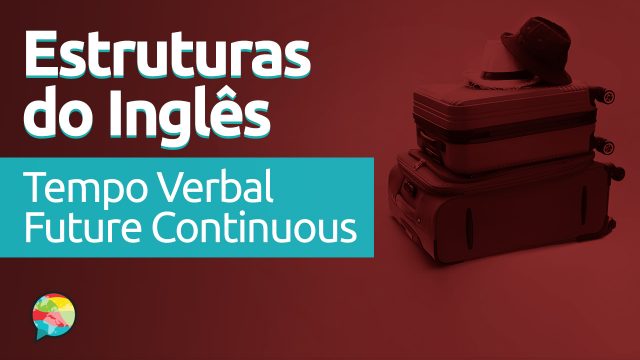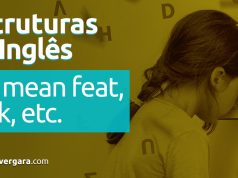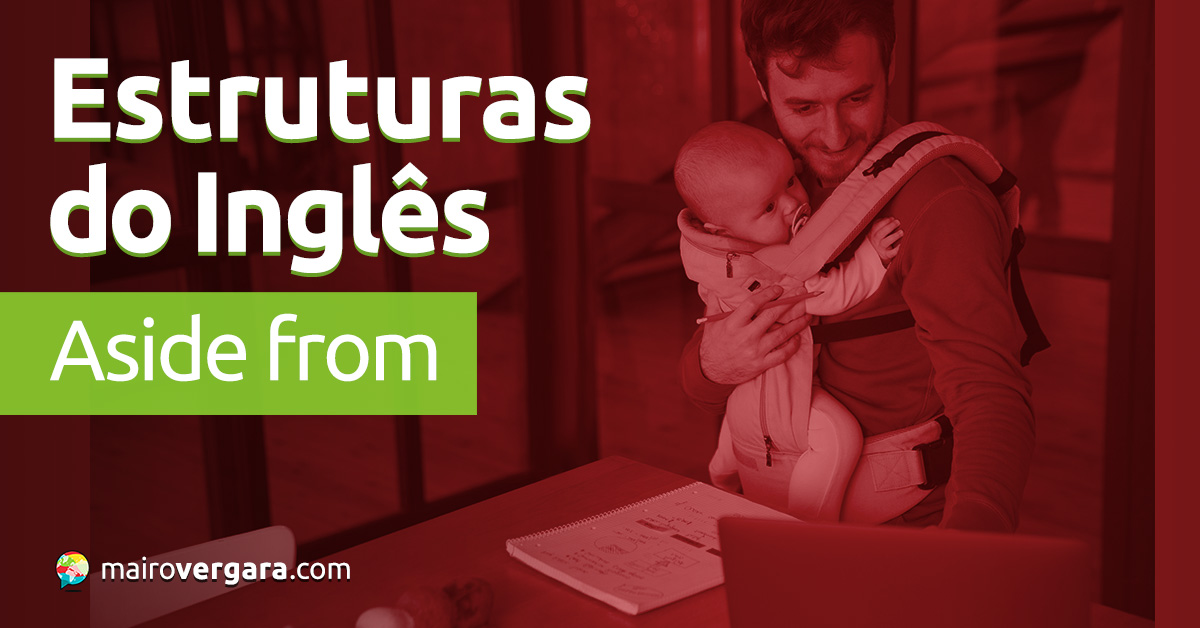Recentemente, tivemos um post sobre o Simple Future. Agora iremos falar sobre o Future Continuous, que é o tempo verbal usado para descrever ações que estarão acontecendo em algum período futuro.
Assim como o Present Continuous e o Past Continuous, o Future Continuous sempre utiliza verbos terminados com -ing (doing, traveling, sleeping etc.). Existem duas possíveis estruturas para este tempo verbal.
A primeira utiliza o verbo modal will e fica assim:
Sujeito + will be + verbo com -ing + complemento
Veja alguns exemplos de frases no Future Continuous utilizando will:
I will be watching TV when she arrives tonight.
Eu estarei vendo TV quando ela chegar hoje à noite.
At 8 PM tonight, John will be washing the dishes.
Às 8 horas da noite hoje, o John estará lavando a louça.
He will be studying at the library tomorrow, so he will not be home.
Ele estará estudando na biblioteca amanhã, então ele não estará em casa.
At midnight, we will still be driving through the desert.
À meia-noite, nós ainda estaremos dirigindo pelo deserto.
Tonight, they will be eating dinner, discussing their plans, and having a good time.
Hoje à noite, eles estarão jantando, discutindo seus planos e se divertindo.
Também podemos formar frases no Future Continuous utilizando going to be. Veja como fica:
Sujeito + verbo to be + going to be + verbo com -ing + complemento
(Caso esteja um pouco enferrujado no verbo to be, leia o artigo Verbo To Be │ Todos os usos e formas.)
Veja exemplos de frases com going to be seguido do verbo to be:
Tonight at 7 PM, I am going to be eating dinner.
Hoje às 7 horas da noite, eu estarei jantando.
I am going to be studying and he is going to be sleeping.
Eu estarei estudando e ele estará dormindo.
I am going to be having lunch at the Madison Hotel, if anything happens and you need to contact me.
Eu estarei almoçando no Hotel Madison, se alguma coisa acontecer e você precisar me contatar.
You are going to be waiting for them at the cinema.
Você estará esperando por eles no cinema.
He is going to be working late, so we won’t see him when we get home.
Ele estará trabalhando até tarde, então nós não o veremos quando chegarmos em casa.
Para frases negativas, basta acrescentar o NOT após o will ou após o verbo to be. Lembre-se que will not pode ser contraído e virar won’t. E para frases interrogativas, basta iniciar a pergunta com o will ou com o verbo to be. Exemplifiquemos isso nos dois exemplos abaixo:
Frase: O Mark estará jogando futebol amanhã.
Afirmativa: Mark will be playing soccer tomorrow.
Negativa: Mark will not be playing soccer tomorrow.
Interrogativa: Will Mark be playing soccer tomorrow?
Frase: Eles estarão viajando na semana que vem.
Afirmativa: They are going to be traveling next week.
Negativa: They are not going to be traveling next week.
Interrogativa: Are they going to be traveling next week?
Simples, né? Veja então mais frases no Future Continuous para você treinar:
I will be preparing dinner when you get here.
Eu estarei preparando o jantar quando você chegar aqui.
I will be waiting for my results anxiously.
Eu estarei esperando pelos meus resultados ansiosamente.
We won’t be drinking juice at the party.
Nós não estaremos bebendo suco na festa.
They will be having dinner at seven. It’s best to call later.
Eles estarão jantando às sete. É melhor ligar mais tarde.
At five o’clock, I will be meeting with the manager to talk about my raise.
Às cinco horas, eu estarei me reunindo com o gerente para falar sobre meu aumento.
At the same time tomorrow, we will be walking through the streets of London.
Nesta mesma hora amanhã, nós estaremos caminhando pelas ruas de Londres.
They won’t be celebrating the new job tonight.
Eles não estarão comemorando o novo emprego hoje à noite.
I will be studying and Peter will be working at that time.
Eu estarei estudando e o Peter estará trabalhando naquela hora.
Brian will be working in the garden and Jane will be cooking.
O Brian estará trabalhando no jardim e a Jane estará cozinhando.
Michael will be running a marathon this Saturday.
O Michael estará correndo uma maratona neste sábado.
Next year, will she be looking for a new job?
Ano que vem, ela estará procurando por um novo emprego?
John told us that he will be working when we arrive at the station, so we will have to get a taxi.
O John nos disse que ele estará trabalhando quando nós chegarmos na estação, então nós teremos que pegar um táxi.
He won’t be feeling well tomorrow.
Ele não estará se sentindo bem amanhã.
What will you be doing on Friday?
O que você estará fazendo na sexta?
David will be playing at the club tonight. We should go and see him.
O David estará tocando no clube hoje à noite. Nós deveríamos ir assisti-lo.
I am going to be working as a teacher someday.
Eu estarei trabalhando como professora algum dia.
I am going to be a little late tomorrow, so I’ll probably miss the start of the ceremony.
Eu estarei um pouco atrasada amanhã, então eu provavelmente irei perder o início da cerimônia.
I’d like to know who will be cleaning up all the mess after the party because it is not going to be me.
Eu gostaria de saber quem irá limpar toda essa bagunça depois da festa porque não será eu.
(Leia o post Clean Up │ O que significa este phrasal verb?)
At the party, everybody is going to be celebrating. Some will be dancing. Others are going to be talking. A few people will be eating pizza, and several people are going to be drinking beer.
Na festa, todos estarão comemorando. Alguns estarão dançando. Outros estarão conversando. Alguns estarão comendo pizza e vários estarão bebendo cerveja.
Conseguiu entender como utilizar o Future Continuous? Acrescente algumas frases neste tempo verbal ao seu Anki e não perca o próximo post de Estrutura. See you next time!

BAIXE O MATERIAL DO POST


















